Conservative Jewish law eases restrictions on gays

Jewish Theological Seminary student Ira Stup wears his opinion on his suit jacket as he stands outside a synagogue in New York Wednesday. Kathy Willens, The Associated Press
December 7, 2006
NEW YORK – Conservative Jewish scholars eased their ban Wednesday on ordaining gays, upending thousands of years of precedent while stopping short of fully accepting gay clergy.
The Committee on Jewish Law and Standards, which interprets religious law for the movement, adopted three starkly conflicting policies that nonetheless gave gays a wider role. Four committee members who wanted to uphold the ban outright resigned in protest after the vote.
One policy maintains the prohibition against gay clergy. Another, billed as a compromise, maintains a ban on male sodomy but permits gay ordination and allows blessing ceremonies for same-sex couples. The third policy supports the ban on gay sex in Jewish law and notes that some gays have successfully undergone therapy that changes their sexual orientation.
That leaves seminaries and synagogues to decide on their own which approach to follow.
The decision will test what Conservative Jewish leaders call their “big tent” – allowing diverse practices by the movement’s more than 1,000 rabbis and 750 North American synagogues.
Get The Daily Illini in your inbox!
“We believe in pluralism,” said Rabbi Kassel Abelson, the committee chairman, in announcing the vote. “We recognized from the very beginning of this movement that no single position can speak to all members of the community.”
But Rabbi Joel Roth, one of the four members who resigned, said the decision was “outside the pale of acceptability” in Jewish law. Roth was author of the paper that upheld the ban.
The 25-member panel voted at the end of a two-day closed meeting in an Upper East Side synagogue. Students from Keshet, a gay advocacy group at the Jewish Theological Seminary, the flagship school of Conservative Judaism, huddled outside as they awaited the results.
Jay Michaelson, director of Nehirim, a group that provides spiritual retreats and other programming for gay Jews, said he was “pleased not thrilled” about the vote.






